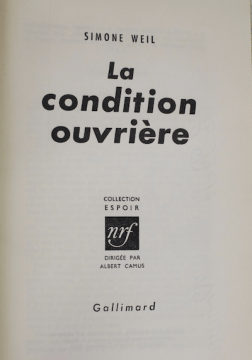Robert Zaretsky in LA Review of Books:
 IN THE SUMMER or fall of 1943, La France libre, the London-based provisional government led by General Charles de Gaulle, received a letter from across the Channel. In three closely typed pages, the writer, identifying himself as “un résistant intellectuel,” described the “anguish” he felt as he surveyed the political and moral landscape of Nazi-occupied France. We are teetering, he declared, between renaissance and ruin. Moreover, those struggling on behalf of the former were driven by two often competing ideals: “The clear desire for justice and profound demand for liberty.” Yet, he warned, if we can one day create a doctrine based on these two imperatives, they would lead to the “complete overhaul” of the nation’s constitutional and financial institutions. One way or another, in short, France would never again be the same.
IN THE SUMMER or fall of 1943, La France libre, the London-based provisional government led by General Charles de Gaulle, received a letter from across the Channel. In three closely typed pages, the writer, identifying himself as “un résistant intellectuel,” described the “anguish” he felt as he surveyed the political and moral landscape of Nazi-occupied France. We are teetering, he declared, between renaissance and ruin. Moreover, those struggling on behalf of the former were driven by two often competing ideals: “The clear desire for justice and profound demand for liberty.” Yet, he warned, if we can one day create a doctrine based on these two imperatives, they would lead to the “complete overhaul” of the nation’s constitutional and financial institutions. One way or another, in short, France would never again be the same.
De Gaulle most probably never read this letter. He was, for the most part, too busy making life wretched for Franklin Roosevelt and Winston Churchill to find the time to read or reflect on the clandestine missives sent by the internal resistance movements. Besides, while de Gaulle cast himself as the embodiment of a free France, he had a cast of hundreds to attend to the details of achieving this freedom. This cast included analysts who read these letters from France, recapped the contents, and reported them to their immediate superiors.
This particular letter, I think, would have caught the attention of one of the analysts. Like the writer, the analyst was thinking hard how to balance the often-competing imperatives of liberty and justice. Equally important, she wanted to be sent to France in order to fight, like the writer, in the Resistance. As she told a friend, the suffering of those in France “obsesses and overwhelms me to the point of annihilating my faculties and the only way I can revive them and release myself from the obsession is by getting for myself a large share of danger and hardship.” Her efforts to persuade her superiors, however, were repeatedly rebuffed. Indeed, when de Gaulle himself read one of the analyst’s proposals — namely, to lead a group of nurses as poorly trained as herself to be parachuted onto a battlefield — he dismissed her as “crazy.”
More here.
